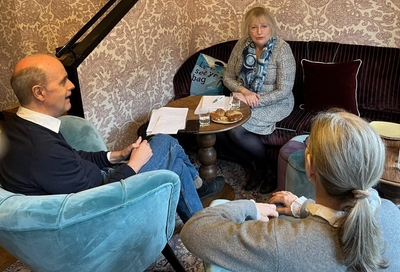Jacob’s AML journey
Mendus presented updated survival data from the ADVANCE II Phase 2 trial during the American Society of Hematology (ASH) conference last December, which showed that the majority (13/20) of patients treated with vididencel were alive at a median follow-up of 41.8 months, with 11 out of the 20 patients still in first complete remission, without relapse. To hear first-hand what vididencel treatment can mean for AML patients, Mendus Director Clinical Operations Annelies Legters had a meeting in Bergen, Norway with Jacob, one of the participants in the ADVANCE II trial.
Jacob’s coughing started in March 2017 and by August it was continuous and now severe backpain and night sweats were making him miserable. He already struggled with heart and lung issues, but his health continued to decline further, and he became very sick. His wife, Ann, suspected something was seriously wrong and joined him at the doctor’s in Norway. Days after the appointment, Jacob was diagnosed with acute myeloid leukemia (AML). Due to his lung fibrosis, he was kept in a coma for six weeks during the first round of chemo.
With the first round over, he slowly woke and could only move his eyes, communicating with Ann and the medical team by blinking during the following months. A half year later he moved to rehab to regain some of the 20kg he had lost and to learn to walk and eat again. But with Jacob still battling AML, there were few options but to try a second round of chemo. This time he would undergo the treatment at home with Ann managing his care for the following months. Their children wore protective clothing when visiting to reduce the chance of infection.
“Going through chemo to fight my AML was incredibly difficult because of the painful side effects,” said Jacob. “I wouldn’t have made it if it weren’t for Ann supporting me during those difficult months.”
Still, after seven months of the second chemo round, Jacob wasn’t able to completely shake the disease as marked by the MRD (measurable residual disease). A fresh approach was crucial. In 2019 the hematologist in Oslo mentioned a new treatment in Bergen at the Haukeland University Hospital run by professor Bjørn-Tore Gjertsen. Jacob and Ann met with Bjørn to learn about the Advance II clinical trial, which used Mendus’ drug vididencel as a maintenance therapy for AML patients diagnosed with MRD.
“Hearing there was another option that could possibly work was fantastic news,” he said. “After two rounds of chemo and the horrible side effects, we were excited by this opportunity.”
The treatment consisted of a series of injections of vididencel, a drug designed to use the body’s own immune system to build up active, long-lasting immunity against tumor cells. The biggest side effect was redness and some swelling around the injection site for a few days, far easier to manage than the side effects from his months on chemo.
“Bjorn and his team were very kind to us, and the experience of going through this clinical trial was well worth it given the close attention they received. The MRD is gone and while I still struggle with effects from the earlier chemo and my lung and heart issues, my quality of life has improved,” Jacob said. “Ann and I exercise every day together, taking walks in the forest or at the gym. We take this day by day and with our first grandchild set to join us in August we have a lot to look forward to.”

